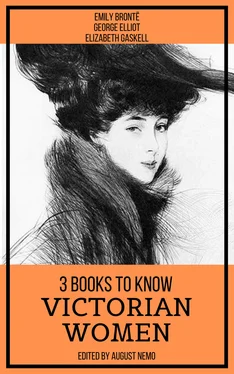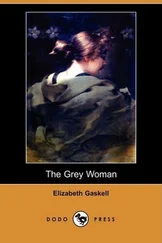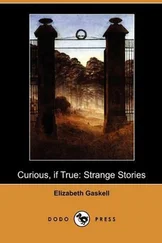“’You forget you have a master here,’ says the tyrant. ‘I’ll demolish the first who puts me out of temper! I insist on perfect sobriety and silence. Oh, boy! was that you? Frances, darling, pull his hair as you go by: I heard him snap his fingers.’ Frances pulled his hair heartily, and then went and seated herself on her husband’s knee; and there they were, like two babies, kissing and talking nonsense by the hour—foolish palaver that we should be ashamed of. We made ourselves as snug as our means allowed in the arch of the dresser. I had just fastened our pinafores together, and hung them up for a curtain, when in comes Joseph on an errand from the stables. He tears down my handiwork, boxes my ears and croaks —
“’T’ maister nobbut just buried, and Sabbath no o’ered, und t’ sound o’ t’ gospel still i’ yer lugs, and ye darr be laiking! Shame on ye! sit ye down, ill childer! there’s good books enough if ye’ll read ‘em! sit ye down, and think o’ yer sowls!’
“Saying this, he compelled us to square our positions that we might receive from the far-off fire a dull ray to show us the text of the lumber he thrust upon us. I could not bear the employment. I took my dingy volume by the scroop, and hurled it into the dog-kennel, vowing I hated a good book. Heathcliff kicked his to the same place. Then there was a hubbub!
“’Maister Hindley!’ shouted our chaplain. ‘Maister, coom hither! Miss Cathy’s riven th’ back off “Th’ Helmet o’Salvation,” un’ Heathcliff’s pawsed his fit into t’ first part o’ “T’ Brooad Way to Destruction!” It’s fair flaysome that ye let ‘em go on this gait. Ech! th’ owd man wad ha’ laced ‘em properly—but he’s goan!’
“Hindley hurried up from his paradise on the hearth, and seizing one of us by the collar, and the other by the arm, hurled both into the back kitchen; where, Joseph asseverated, ‘owd Nick’ would fetch us as sure as we were living: and, so comforted, we each sought a separate nook to await his advent. I reached this book, and a pot of ink from a shelf, and pushed the housedoor ajar to give me light, and I have got the time on with writing for twenty minutes; but my companion is impatient, and proposes that we should appropriate the dairywoman’s cloak, and have a scamper on the moors, under its shelter. A pleasant suggestion—and then, if the surly old man come in, he may believe his prophecy verified—we cannot be damper, or colder, in the rain than we are here.”
I suppose Catherine fulfilled her project, for the next sentence took up another subject; she waxed lachrymose.
“How little did I dream that Hindley would ever make me cry so!” she wrote. “My head aches, till I cannot keep it on the pillow; and still I can’t give over. Poor Heathcliff! Hindley calls him a vagabond, and won’t let him sit with us, nor eat with us any more; and, he says, he and I must not play together, and threatens to turn him out of the house if we break his orders. He has been blaming our father (how dared he?) for treating H. too liberally; and he swears he will reduce him to his right place-”
I began to nod drowsily over the dim page: my eye wandered from manuscript to print. I saw a red ornamented title —“Seventy Times Seven, and the First of the Seventy-First. A Pious Discourse delivered by the Reverend Jabes Branderham, in the Chapel of Gimmerdon Sough.” And while I was, half consciously, worrying my brain to guess what Jabes Branderham would make of his subject, I sank back in bed, and fell asleep. Alas, for the effects of bad tea and bad temper! What else could it be that made me pass such a terrible night? I don’t remember another that I can at all compare with it since I was capable of suffering.
I began to dream, almost before I ceased to be sensible of my locality. I thought it was morning; and I had set out on my way home, with Joseph for a guide. The snow lay yards deep in our road; and, as we floundered on, my companion wearied me with constant reproaches that I had not brought a pilgrim’s staff: telling me that I could never get into the house without one, and boastfully flourishing a heavyheaded cudgel, which I understood to be so denominated. For a moment I considered it absurd that I should need such a weapon to gain admittance into my own residence. Then a new idea flashed across me. I was not going there: we were journeying to hear the famous Jabes Branderham preach from the text —“Seventy Times Seven”; and either Joseph, the preacher, or I had committed the “First of the Seventy-First,” and were to be publicly exposed and excommunicated.
We came to the chapel. I have passed it really in my walks, twice or thrice; it lies in a hollow, between two hills: an elevated hollow, near a swamp, whose peaty moisture is said to answer all the purposes of embalming on the few corpses deposited there. The roof has been kept whole hitherto; but as the clergyman’s stipend is only twenty pounds per annum, and a house with two rooms, threatening speedily to determine into one, no clergyman will undertake the duties of pastor: especially as it is currently reported that his flock would rather let him starve than increase the living by one penny from their own pockets. However, in my dream, Jabes had a full and attentive congregation; and he preached—good God! what a sermon: divided into four hundred and ninety parts, each fully equal to an ordinary address from the pulpit, and each discussing a separate sin! Where he searched for them, I cannot tell. He had his private manner of interpreting the phrase, and it seemed necessary the brother should sin different sins on every occasion. They were of the most curious character: odd transgressions that I never imagined previously.
Oh, how weary I grew. How I writhed, and yawned, and nodded, and revived! How I pinched and pricked myself, and rubbed my eyes, and stood up, and sat down again, and nudged joseph to inform me if he would ever have done. I was condemned to hear all out: finally, he reached the “First of the Seventy-First.” At that crisis a sudden inspiration descended on me; I was moved to rise and denounce Jabes Branderham as the sinner of the sin that no Christian need pardon.
“Sir,” I exclaimed, “sitting here within these four walls, at one stretch, I have endured and forgiven the four hundred and ninety heads of your discourse. Seventy times seven times have I plucked up my hat and been about to depart—Seventy times seven times have you preposterously forced me to resume my seat. The four hundred and ninety first is too much. Fellow-martyrs, have at him! Drag him down, and crush him to atoms, that the place which knows him may know him no more!”
“Thou art the man!” cried Jabes, after a solemn pause, leaning over his cushion. “Seventy times seven times didst thou gapingly contort thy visage—seventy times seven did I take counsel with my soul—Lo, this is human weakness: this also may be absolved! The First of the Seventy-First is come. Brethren, execute upon him the judgment written. Such honour have all His saints!”
With that concluding word, the whole assembly, exalting their pilgrim’s staves, rushed round me in a body; and I, having no weapon to raise in self-defense, commenced grappling with Joseph, my nearest and most ferocious assailant, for his. In the confluence of the multitude, several clubs crossed; blows, aimed at me, fell on other sconces. Presently the whole chapel resounded with rappings and counter-rappings: every man’s hand was against his neighbour; and Branderham, unwilling to remain idle, poured forth his zeal in a shower of loud taps on the boards of the pulpit, which responded so smartly that, at last, to my unspeakable relief, they woke me. And what was it that had suggested the tremendous tumult? What had played Jabes’s part in the row? Merely, the branch of a fir-tree that touched my lattice, as the blast wailed by, and rattled its dry cones against the panes! I listened doubtingly an instant; detected the disturber, then turned and dozed, and dreamt again: if possible, still more disagreeably than before.
Читать дальше












